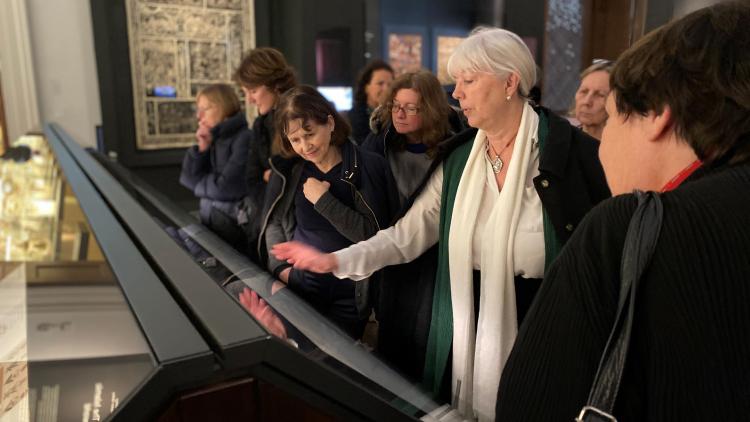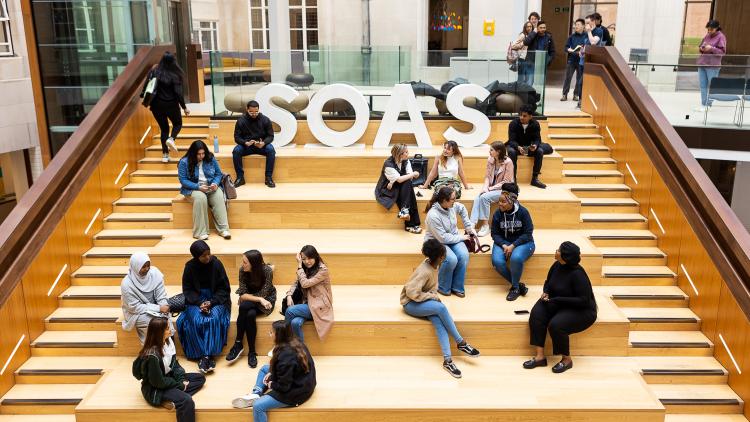Arabic (Modern Standard) Pre-Intermediate Course


Key information
- Duration
- 1 term per sub-level; 10 weeks per term
- Attendance mode
- Part-time, online/blended learning
Course overview
This Pre-Intermediate course is for students who have completed the full Elementary course at SOAS or an equivalent number of hours of formal Arabic language study (approximately 120 hours).
If neither of these apply to you but you think this may be your level, an online assessment can be conducted, please book an assessment.
Learners will be able to converse with confidence, give presentations and engage actively in discussions about the topics they have covered. They will be able to conduct interviews and report on these using the vocabulary and grammar they have learned, read longer and more complex texts in different genres and write with some fluency about a variety of texts and topics of interest to them. This course is delivered by the Language Centre.
Method
The course is taught in Arabic with support in English and includes a healthy exposure to Arabic grammar and vocabulary, while further developing the skills of comprehension in listening and reading, and the skills of expression in speaking and writing.
This will be achieved through 20 hours of blended learning: this is composed of 15 hours of online structured lessons with the teacher. The lessons are supplemented by a minimum of 5 hours of guided independent learning supported by complementary material. The course objective will be achieved within the 10-week course.
Materials
Our course materials page shows you what you need to buy for this course.
Entry requirements and progression route
This course is aimed at students who have completed the full Elementary Course (Arabic MSA Elementary 1, 2, and 3) or equivalent (approximately 120 hours of formal study). After completing Pre-Intermediate 1, students progress onto Pre-Intermediate 2, and then Pre-Intermediate 3. After this, students can begin the Intermediate level.
Please note, that each term, courses are subject to quorum requirements.
For course dates and information, please see our timetables.
Structure
Arabic (Modern Standard) Pre-Intermediate 1
In this course you will:
- learn to talk about personal problems
- explore how to ask for and give advice
- be able to use the negative form of ‘to be’
- understand the use of relative pronouns
- use comparative adjectives
- arrange a holiday by choosing and booking things
- understand and use conditional sentences
- further your understanding of verb forms and patterns
- confidently express your preferences
- familiarise yourself with case endings of verbs
- talk about relationships with friends and family
- write informal letters
- understand various cultural celebrations of the Arab World
- learn about the different religions of MENA and their fasts
- understand the use of lunar and solar months in the Arab World
Arabic (Modern Standard) Pre-Intermediate 2
In this course you will:
- consolidate previously covered grammar rules
- understand the rules of forming colour adjectives
- further develop and practice verb forms and patterns
- be able to express similarities
- understand and use feminine and plural nouns
- explore more case endings of verbs
- learn about the difference in adjectives for people and objects
- write personalised messages for different occasions
- learn to conduct a short interview and report
- discuss the life and work of Nizar Qabbani
- familiarise yourself with features of Arabic media
- understand aspects of Middle Eastern history
- explore the life and work Taha Hussein
- confidently use common Arabic expressions
Arabic (Modern Standard) Pre-Intermediate 3
In this course you will:
- learn to use different tenses to narrate past events
- explore how to describe the development of events and simultaneous events
- understand a wider range of verb forms and patterns
- learn about the life and literature of Naguib Mafouz
- explore the conjugation of irregular ‘doubled’ verbs
- understand the use and role of active and passive participles
- use a wider range of idiomatic expressions
- talk about Arab countries and their festivals
- explore the travels of Ibn Battuta
- understand more about Islamic civilisation
- learn about the border formations of the Middle East
The above is an indication of content that may be covered over the duration of the course but it could vary depending on the level and progress of students in the class.
Contact us
Disclaimer
Important notice regarding changes to programmes and modules.
Related information
See the full list of Language Centre short courses in Arabic on the Arabic language homepage.
Image credit: Mario Cruz via Unsplash









